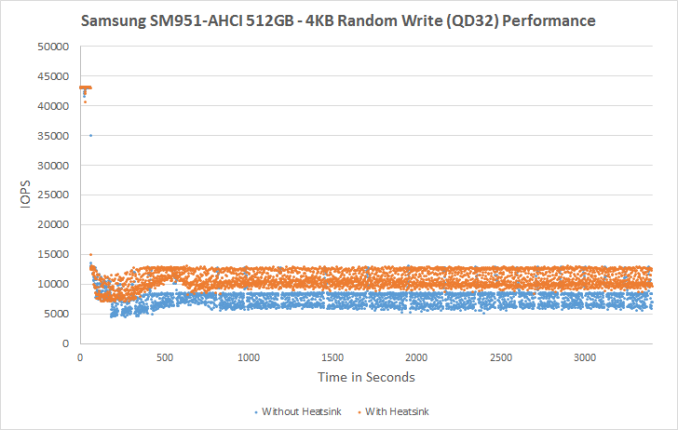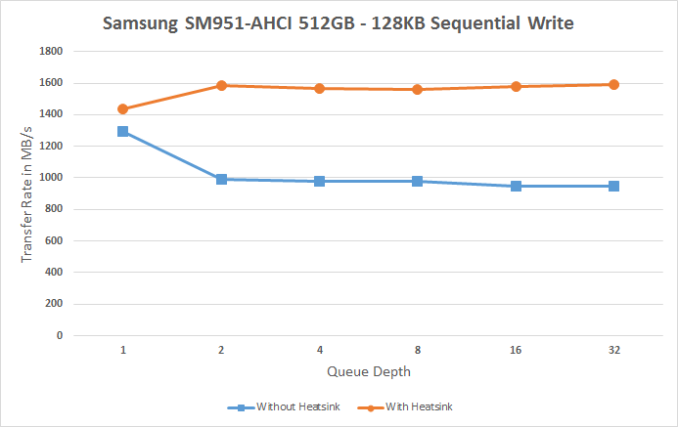Samsung SM951-NVMe (256GB) PCIe SSD Review
by Kristian Vättö on June 25, 2015 9:40 AM ESTThermal Throttling Revisited
When we first tested the SM951-AHCI in February, I noted that the drive seems to be suffering from thermal throttling when subjected to sustained workloads, especially sequential writes. I promised to run tests with a heatsink attached to see what the performance would be without any thermal limitations and now I have some results to present.
For these tests I used the stock 512GB SM951-AHCI and borrowed the M.2 to PCIe adapter with a heatsink from Plextor's M6e Black Edition. Unfortunately I had to send my M6e samples back before I could test the SM951-NVMe, but the purpose of these tests is more to show the impact of thermal throttling in actual client workloads rather than demonstrate the maximum peak performance.
| Samsung SM951-AHCI 512GB Performance | |||
| With Heatsink | Without Heatsink | Performance Delta | |
| The Destroyer (Data Rate) | 471.53MB/s | 455.65MB/s | -3.4% |
| The Destroyer (Latency) | 1323.6µs | 1388.4µs | -4.9% |
| Heavy (Data Rate) | 802.42MB/s | 802.17MB/s | 0.0% |
| Heavy (Latency) | 180.26µs | 181.39µs | -0.6% |
| Light (Data Rate) | 1,250MB/s | 1,240MB/s | -1.0% |
| Light (Latency) | 69.08µs | 69.19µs | -0.2% |
It's clear that the impact of thermal throttling in real world workloads is insignificant. In a worst case scenario where the drive is under a heavy IO workload the performance loss can be 5%, but in anything less intensive the difference is within the margin of error. Even though we truncate idle times to 25µs, it's enough to lighten the workload and reduce thermal throttling compared to a sustained synthetic workload.
Under a sustained 4KB random write workload the difference is more significant as without the heatsink the SM951-AHCI averages 7,878 IOPS, whereas the heatsink bumps that up to 10,873 IOPS.
The same goes for sequential write where throttling is evident and even more significant compared to the random write workload. Without the heatsink the SM951 can sustain peak throughput for about two minutes, which may not sound long but at 1.5GB/s that would translate to 180GB of data written and obviously such massive transfers are very rare.
To sum things up, there is no need to worry about thermal throttling under typical client workloads. There won't be any notable performance loss unless you subject the drive under an intensive sustained workload, which may be relevant to some professional users (e.g. high-end video editing), but not for the typical enthusiast and power user. If you want to ensure that your SM951 operates at full performance at all times, it's not a bad idea to get an adapter with a heatsink, but there is no loss in running the drive without one.












74 Comments
View All Comments
Notmyusualid - Sunday, June 28, 2015 - link
I'm SO with you on that statement. My 840 Evos have been awful. TLC is not for me, and I don't care what benchies you throw at me, I won't buy TLC nand now from anybody.Notmyusualid - Sunday, June 28, 2015 - link
Sorry, just noticed this is MLC and not TLC. Well, still going to be buyer-beware due to my last experience of slow down, firmware revisions etc with Samsung...Impulses - Tuesday, July 21, 2015 - link
There's not one SSD OEM that hasn't suffered some sorta critical firmware bug, and many have suffered thru more of it than Samsung and/or hardware defects...Crucial had some bricked drives, as did Intel using their own controller, never mind their Sandforce drive which had broken encryption, I'm more concerned about how they react and respond.
Samsung wasn't brilliant at it from what I've seen, but they did keep re issuing updates so at least they stuck with it. The fact that they ignored the non EVO (which few seem to bring up) seems the most egregious error to me.
The newest iteration of 3D TLC is quite a different animal anyway... I've had two Intel drives, two 128GB 830s, bought a 500GB 840 EVO as a gift, just bought a 1TB 850 EVO, and I'll probably get a 256GB SM951. /shrug
Romney4President - Friday, June 26, 2015 - link
What the heck...? No Encryption... :/ Can anyone shed some light on this? If I remember right other manufactures coming out with NVMe will be supporting hardware based encryption. This is a deal breaker to me. Also do you think later this year we'll see a Samsung version with encryption?Perk5 - Monday, June 29, 2015 - link
Can this SM951nvme be used at full speed with asrockextreme6 z97 mobo, which has ultra m.2 slot. also the ahci model of sm951 has been sucessfully used as boot drive at full speed by many users having this mobo. And are there any drawbacks of the asrock mobo ?boe - Tuesday, June 30, 2015 - link
Just bring on those 10TB and 32TB SSD drives. I need them like yesterday.JKJK - Sunday, July 12, 2015 - link
It seems that there is a firmware update that makes the drive handle fua more effectively:http://www.legitreviews.com/samsung-sm951-nvme-m-2...
Impulses - Tuesday, July 21, 2015 - link
They got a second drive with updated firmware, no word about an actual update, being mostly OEM drives they might've not even built in a way to update the firmware...JoKO4184 - Monday, July 20, 2015 - link
So, if both the AHCI and NVMe have the same hardware, do you guys reckon we'd be able to flash the NVMe firmware onto the AHCI? Or at least if Samsung feels generous enough to provide the upgrade for all AHCI owners?caelumtech - Thursday, August 27, 2015 - link
If the two variants are so similar, what prevents them from being "flash" compatible? Could an intrepid hacker Download the firmware from the NVME device and overwrite the flash of the AHCI version?